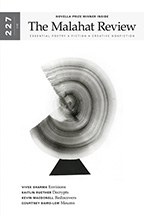Reviews
Fiction Review by Justin Pfefferle
Kenneth Radu, Butterfly in Amber (Montreal: DC Books, 2014). Paperbound, 270 pp., $21.95.
In Kenneth Radu’s latest novel, Butterfly in Amber, Delia, an independent woman “of a certain age,” leaves Montreal and her younger lover, Yves, for a vacation in Russia. A tourist, not a traveller, she sails the Volga on board a cruise ship, where she’s surrounded by fellow North American oldsters and a young European staff—including Kostya, a “Russian lad” whose eye Delia catches and whom she takes on as a lover for the duration of her trip. Whether she seduces the youth with her beauty (which, the novel continues to reiterate, has necessarily faded with age) or “by the promise of goods and rubles,” neither Delia nor the reader knows for certain. Whatever the case, she accepts that at her advanced age she can no longer expect to indulge her desires without having to pay for them somehow.
a certain age,” leaves Montreal and her younger lover, Yves, for a vacation in Russia. A tourist, not a traveller, she sails the Volga on board a cruise ship, where she’s surrounded by fellow North American oldsters and a young European staff—including Kostya, a “Russian lad” whose eye Delia catches and whom she takes on as a lover for the duration of her trip. Whether she seduces the youth with her beauty (which, the novel continues to reiterate, has necessarily faded with age) or “by the promise of goods and rubles,” neither Delia nor the reader knows for certain. Whatever the case, she accepts that at her advanced age she can no longer expect to indulge her desires without having to pay for them somehow.
Radu litters the novel with references to literary giants: Shakespeare, Dostoyevsky, Austen, and Tolstoy. Yet Nabokov, to whom Radu never refers, represents its most obvious influence. In the most chilling scene in Nabokov’s Lolita, Humbert Humbert describes how he mollified his “nymphet” victim by showering her with gifts, most of them cheap, mass-produced trinkets that he picked up in a small-town giftshop: “I bought her four books of comics, a box of candy, a box of sanitary pads, two cokes, a manicure set, a tennis racket, roller skates with white high shoes, field glasses, a portable radio set, chewing gum, a transparent raincoat, sunglasses, some more garments—swooners, shorts, all kinds of summer frocks.” An inventory of impoverished American mass culture, the list reminds the reader of the childishness of the titular character. Fully dependent upon her adult kidnapper, Lolita interprets the gifts as expressions of care. Humbert recalls that although “at the hotel we had separate rooms [. . .] in the middle of the night she came sobbing into mine, and we made it up very gently. You see, she had absolutely nowhere else to go.”
Kostya, too, has absolutely nowhere else to go, trapped as he is by poverty and stuck on a ship where he must cater to the demands of his aged benefactress. If he isn’t quite the Lolita to Delia’s Humbert, neither is he fully an adult: “She assumed he was eighteen or nineteen, no more than twenty, but he possessed the loveliness of a younger male who had just recently emerged from the indistinctness of pubescence into the vigour of a man’s body. She couldn’t inquire.” Later, she wonders: “what was the minimum age requirement here,” but “did not pause long enough over the question to find a suitable answer. Kostya was more than a mere boy; chronology beyond that did not signify except in the narrowest of legal terms, and who, anyway, was paying attention?” Notwithstanding the prying eyes of the other ladies on board the ship—at least one of whom seems likely to have had a tryst with Kostya, too—nobody seems inclined to begrudge Delia her pleasures. And why should they? Devoid of the obvious power imbalance that defines the relation between Humbert and Lolita, Delia’s affair with Kostya confronts the reader with a shadow of the ethical conundrum that Nabokov poses. However limited his prospects might be, Kostya is hardly Delia’s victim; recalling Lolita, one almost wishes that he were.
An unapologetic aesthete, Humbert seduces his audience through the virtuosity of his first-person narration. He takes an aesthetic and sexual interest in Lolita, and implies—and very nearly convinces the reader—that he’s rescuing her from a crass, philistine culture by kidnapping her. Likewise, Delia’s appreciation of her boy lover is at least partly aesthetic: “Keeping her eyes fixed on Kostya’s head, she smiled as she would smile before a work of art she found appealing.” Delia, though, is no highbrow; far from being repelled by the trappings of the culture industry, she embraces the tourist’s dictum not to let the messiness of real life spoil afternoons perusing giftshops and markets. “The point of travel,” the narrator observes, “was fun and name-dropping when you returned home, not current events or political insight. [. . .] The purpose of this trip was to travel backward to an idealized Romanov time and pretend that contemporary Russia did not exist.” Whether or not the novel expects its reader to endorse this singularly middle-class attitude, it complies with Delia’s wish not to trouble her head with politics by making little mention of the milieu in which her sexual and economic transactions occur. Outside the odd allusion to Chechnya, the narrative maintains its focus on the ship, reconstructed churches, and tourist traps where Delia competes with other vacationers for the attention and affection of the Russian youth. She’s merely one consumer among many: the kind of person for whom Humbert reserves his harshest judgements.
Radu’s third-person omniscient narration mitigates the kind of ambiguity that defines the account of Nabokov’s unreliable narrator. Stylistically and ethically neutral, it neither provides the protagonist with complexity nor invites the reader to grapple with anything like an aesthetic challenge or moral dilemma. There is, however, a first-person narrator on board the ship: Frank, an old windbag who claims to be the grandson of Tsar Nicholas II, executed by the Bolsheviks in July of 1918. Compelled, like Coleridge’s Ancient Mariner, to repeat his tale of family woe to anyone who agrees to listen, Frank makes a nuisance of himself by telling the same story, over and over, albeit with the rhetorical flourishes of a skilled orator. Explaining his tendency to ramble, he says: “Sometimes the burden of history, Delia, is too much to bear.” Radu might have done well to take his character as a cautionary example of one who encumbers himself with a great and terrible past. By writing a novel that invites comparison to a literary masterpiece, he, like Frank, casts himself in the long shadow of an ancestor.
—Justin Pfefferle









